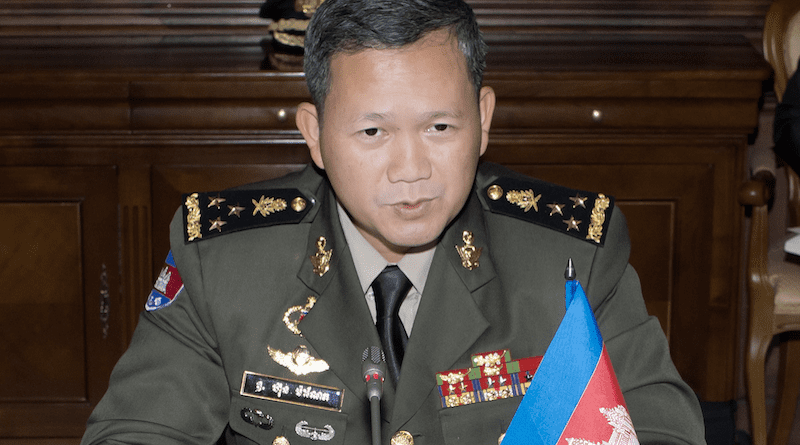Cambodia: Hun Sen Says Son Could Be Installed As PM Within Weeks Of Election
By RFA
Prime Minister Hun Sen told a Chinese television station that his eldest son could become prime minister as soon as three weeks after Sunday’s parliamentary elections.
“I am walking on the right path to secure country stability for younger generations,” he said in the interview with China’s Phoenix TV that aired on Thursday. “I have sacrificed my power. Hun Sen has sacrificed power for peace for a long time.”
Until recently, it was widely believed that the 70-year-old Hun Sen would continue as prime minister through 2028, when the next general election is scheduled to take place. He said publicly in 2021that Hun Manet would one day follow him as prime minister.
“This is the closest we’ve had yet to a definitive public confirmation about the timing of the handover of power,” author and journalist Sebastian Strangio wrote on Twitter.
The ruling Cambodian People’s Party, which currently holds all 125 seats in the National Assembly, is expected to sweep Sunday’s vote.
The National Election Committee in May blocked the main opposition Candlelight Party from appearing on the ballot, citing inadequate paperwork.
Hun Manet is listed as the CPP’s top candidate from Phnom Penh. On Friday – the last day for official campaigning – he led a large parade of party supporters through the streets of the capital.
“Within three or four weeks, Hun Manet can become the prime minister,” Hun Sen told Phoenix TV. “We will wait and see how people respond. After that Hun Manet is able to work.”
New blood incoming
The CPP has ruled Cambodia since 1979. Recent appointments and promotions in several government ministries indicated that the sons and daughters of longtime officials would be assuming new leadership roles after the election.
CPP spokesman Sok Ey San confirmed to Radio Free Asia on Friday that a post-election government cabinet will be “90 percent new blood,” with only a few ministers staying on.
“The new blood will be working with the old blood,” he said.
Finland-based political analyst Kim Sok told RFA that the new cabinet will continue to be controlled by Hun Sen.
“Hun Sen knows that Hun Manet can’t work with the current ministers so he removes the existing ministers so his son can easily control them,” he said.
Hun Sen has said in the past that he would retain influence behind the scenes as head of the CPP after stepping down as prime minister.
West Point graduate
Hun Manet, 45, is a graduate of the elite United States Military Academy at West Point. He holds a masters in economics from New York University and another graduate degree from the University of Bristol in the United Kingdom.
He traveled with his father to Beijing in February to attend meetings with Chinese President Xi Jinping and Premier Li Keqiang.
Exiled opposition leader Sam Rainsy said at the time that Hun Sen was trying to cement personal ties with the Chinese Communist Party so that Beijing would support a handover of power to Hun Manet.
Sam Rainsy told RFA on Friday that Hun Manet will have no legitimacy as prime minister. He repeated a recent plea to voters to destroy their ballots on Sunday to show their support for the opposition.
In March, Hun Manet was promoted to the rank of four-star general. He recently suspended his role as deputy commander-in-chief of the Royal Cambodian Armed Force to run for the Assembly.
“I trained him to be able to work. If he can’t be a prime minister he can do something else for the sake of the country,” Hun Sen said in the Phoenix TV interview.
Changes to the Constitution last year did away with a requirementthat the Assembly vote to approve a newly designated prime minister, a move believed aimed at easing the transition to Hun Manet.
“Hun Manet can become the prime minister or not based on the Constitution,” the prime minister told Phoenix TV. “No one has the right to stop Hun Manet when he doesn’t breach any law.”

